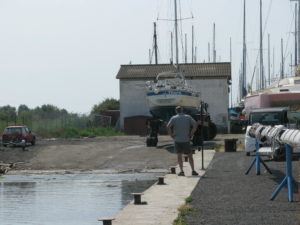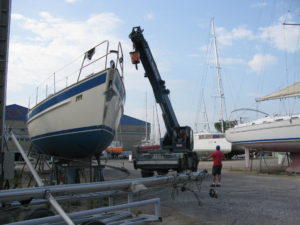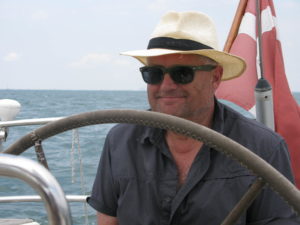Again in France, now Mediterranean
43° 23′ 15″ N, 4° 48′ 15.84″ E
June 29, 2016
Our driver is agitated. Why do those women not move their car so he can get past?
Fools! He opens the car window, shouting to the two women, that they should turn into a parking lot, so he can get past.
He did not quite understand the situation.
The two women backed out of their parking space exactly at the same time as our driver and they prepare to drive one way while he prepares to drive the other way. Now it is bumper to bumper. One woman gets out of the car and explains that this road is one-way, and that he is heading in the wrong direction. Therefore he must leave room for them to continue.
He snorts. Women. “Oh, la, la“. With his hand, he shows that these very women are impossible to explain to. “Je suis importante,” he said in a last attempt to win the match. “I am important.” It makes no impression. Our driver drives cursing back into position, leaving the women to pass and drives out again, while he mumbles about amateurs, women, people with no respect for authority and rules of the road.
Kirsten and I are sitting in the passenger seats and we see how the large arrow in the roadway show that it were the two women who were right. Our driver is a fool.
And we are back in France. Ready to resume our “circumnavigation in stages” on the good ship Ronja. A Swedish-built Malö 36, beautiful and solid. The past 11 months she has been parked on land 50 km west of Marseille. At Navy Service in Port Saint Louis du Rhone.
Our fool of a driver has just fetched us in the arrivals hall at Marseille airport with a sign from Navy Service: “Mr. Jensen “. It’s us. He is certainly 80+, looks like an angry Santa Claus with a white beard and rimless glasses, speaks only French and has probably exceeded the expiration date on his driver licence. When we came out from the arrival hall of the airport’s parking lot, he could not remember where he had put his car. Wait right here, he said and circled aimlessly.
Sigh. Who are we going to entrust our life here? He finds the car, we throw our two soft bags into the back – and then comes the two women and insist on their right. It’s not his day, this driver.
Navy Service is a great place. They have 1,200 boats in winter storage on land. They have specialized in lifting the ships on shore, park them and later – after several months – to put them in the water again. Others cannot. They operate cranes – boom cranes and ship cranes. And they are good.
In the living area – like some parasites – a dozen small independent craft businesses are operating. Some of these may prepare your engine for the winter, other repair epoxy damage, others can sew your storm- and cold- resistant nordic cockpit tent into a light and airy, Mediterranean-bimini. It is expensive. But damn it, it’s great.
I think it is a French specialty: Port du sec. Dry ports. Large paved or gravel areas where French and globetrotters leave their boats winter storage with masts on. It protects the boat against fouling, let them dry out and perfectly suited to those who still have only a sailing season of a few months.
Even with help from local craft people we sailors often forget, how much work it takes to make a sail boat ready to sail. The mast must be cleaned. Shroud and stays needs to be adjusted. Electrical installations between the mast and the boat must be restored. Bulbs should be changed. The drain should to be cleaned. Sails has to be put on. Defective parts replaced. Everything must have cleaning and polishing. Water and food should be stored.
It takes days. More time than anyone just walk around and remember. We get it all done, even if the sun above the Rhone delta is relentless. We prefer to work early morning and late evening, and at night we struggle with mosquitoes.
While we work we sometimes get a glimpse of our driver from the airport. He seems to function also as a worker in Navy Service. Today he drives a truck, moving containers and large bins with a tight-lipped expression.
No need to get in his way. None.


